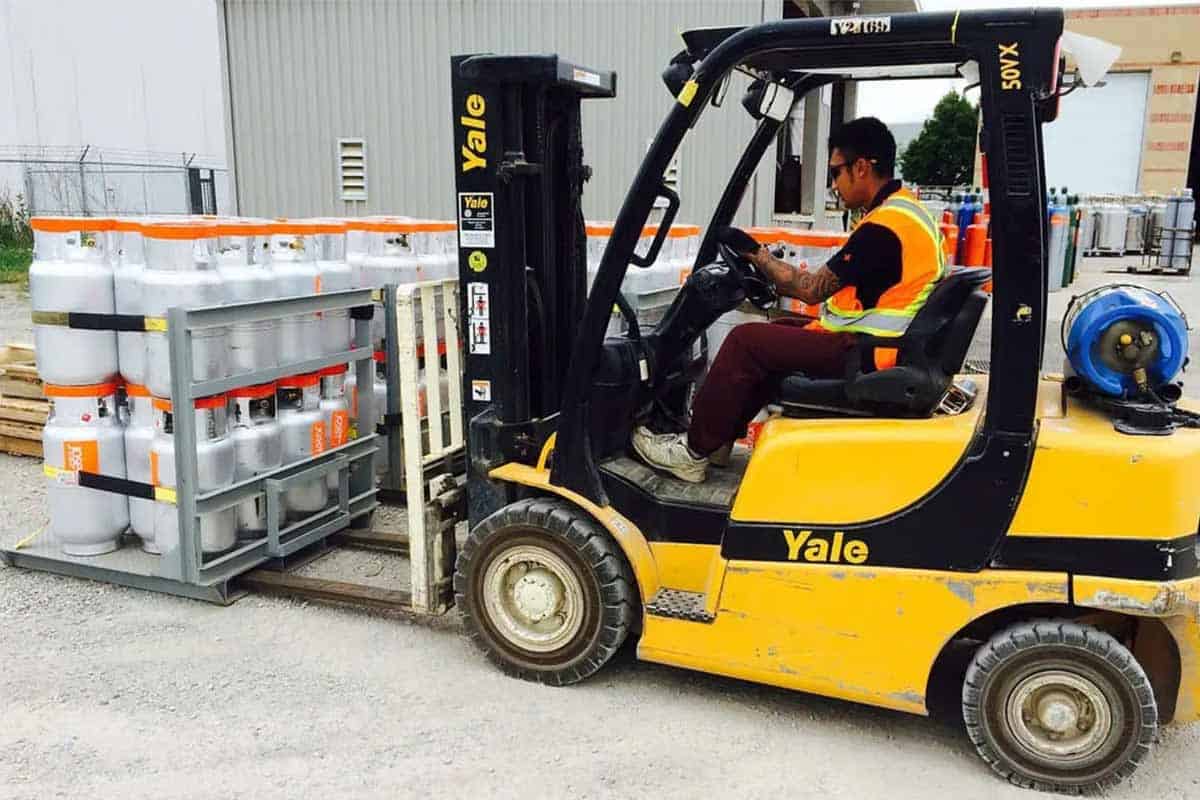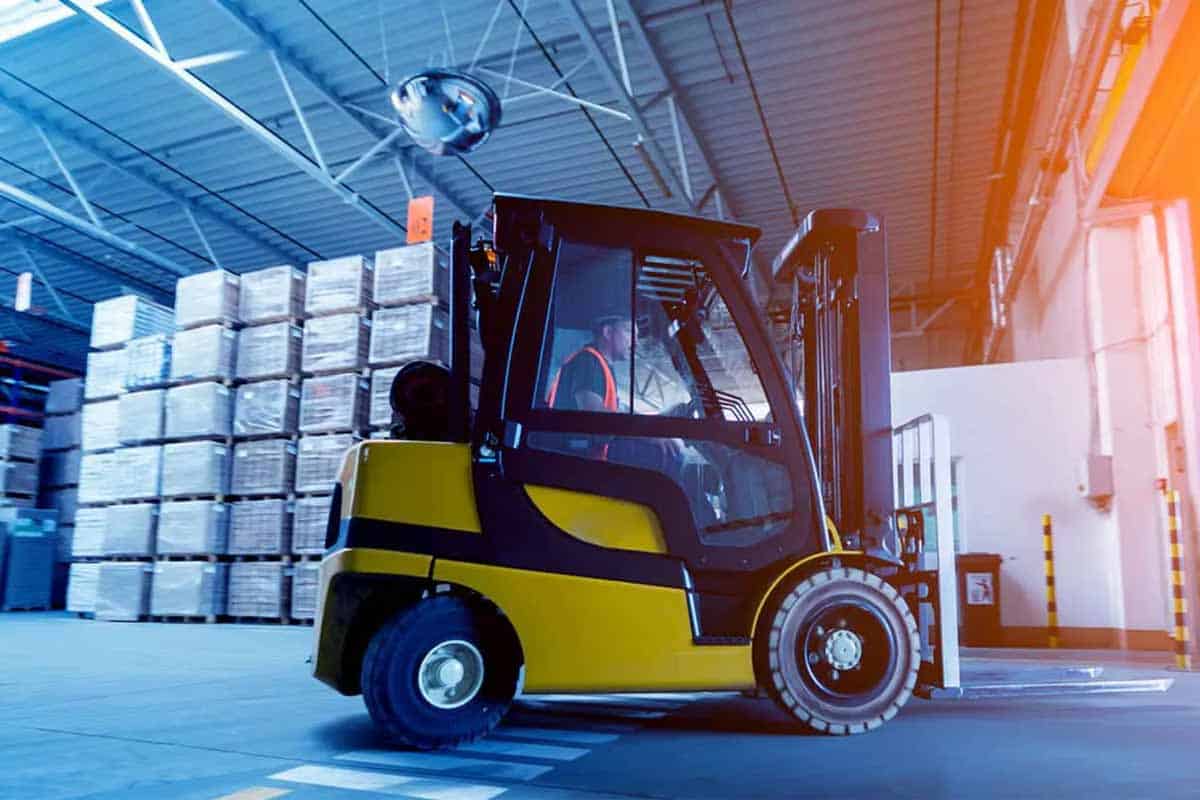The Ultimate Guide to Forklift Propane Cylinder Sizing and Run-Time for GTA Operators
November 12, 2025 4:30 pm
Operating a propane-powered forklift efficiently in the busy Greater Toronto Area (GTA) demands a solid understanding of its fuel source: the liquid propane (LP) cylinder. Knowing the correct cylinder size for your specific lift truck and accurately estimating how long it will run are critical for maintaining productivity and avoiding unexpected downtime. This knowledge is especially important in high-demand environments like warehouses and distribution centres where every minute counts. Getting the basics right—from understanding tank capacity to calculating consumption rates—is the foundation of a streamlined material handling operation. A well-managed propane supply means fewer interruptions and a safer, more predictable workday for everyone involved.
The performance of your forklift is directly tied to the quality and availability of your fuel. Reliable propane delivery service is just as important as the mechanical condition of the truck itself. For GTA operators, having a trustworthy propane supplier in GTA ensures you always have a full tank ready to go, minimizing delays. This guide breaks down the essential factors that influence propane consumption and offers practical tips for ensuring your lift truck is always fuelled and ready for action.
Essential Propane Cylinder Types and Sizes
Forklifts typically use cylinders that fall into two main categories based on capacity. These capacities are usually defined by the weight of the propane they hold when full, not the gross weight of the tank.
- 33-Pound Capacity Cylinder (The Industry Standard):
- This is the most common size used across a broad range of internal combustion (IC) forklifts, including both cushion and pneumatic tire models.
- It generally holds about 7.9 to 8 gallons of liquid propane.
- When full, the cylinder and propane combined weigh roughly 55 to 57 pounds.
- It’s designed to offer a good balance between run-time and the manageable weight for operators to safely change.
- Its widespread availability makes it the easiest tank to source and exchange with any propane supplier in GTA.
- 20-Pound Capacity Cylinder (Lighter Duty):
- These are sometimes used for smaller, lighter-duty lift trucks, pallet jacks, or smaller industrial heating applications.
- They hold about 4.7 gallons of liquid propane.
- Due to their lower capacity, they offer significantly less run-time, making them less suitable for constant, heavy-duty material handling operations.
- Operators often favour the 33-pound size for the extended run-time, reducing the frequency of changes.
Factors Influencing Propane Consumption and Run-Time
Predicting exactly how long a cylinder will last is a calculation that changes based on several variables unique to your operation. There is no single “one-size-fits-all” answer, so operators must consider these key factors:
- Forklift Engine Size and Horsepower:
- Larger, more powerful lift trucks with bigger engines naturally burn more propane per hour than smaller, standard models.
- A high-horsepower engine running consistently at peak performance will drain a tank faster.
- Load Weight and Lifting Frequency:
- The hydraulics, which perform the lifting and tilting, are major fuel consumers.
- Heavy loads require the engine to work much harder and longer to power the hydraulic pump.
- Forklifts constantly handling maximum capacity loads will have a significantly shorter run-time compared to those moving lighter materials.
- Driving Habits and Operator Technique:
- Aggressive driving, rapid acceleration, and sudden braking waste fuel. The engine must work harder to get the truck moving again.
- Maintaining a steady, controlled speed is the most fuel-efficient method.
- Engine Condition and Maintenance:
- A well-maintained engine runs cleanly and efficiently.
- Worn spark plugs, clogged air filters, or improperly tuned carburettors can drastically increase propane consumption, sometimes by as much as 10–20%.
- Regular servicing ensures the engine is performing at its optimal level.
- Ambient Temperature (Especially Relevant in the GTA):
- Propane vaporizes better in warmer temperatures.
- In cold GTA winters, the propane liquid in the tank can struggle to vaporize quickly enough, potentially causing the engine to “starve” for fuel under heavy loads, or simply run less efficiently.
- Some forklifts use a heat exchanger to address this, but cold weather always impacts performance and efficiency.
Optimizing Propane Usage and Supply

To maximize the hours you get from each tank and ensure a constant supply, operators and managers can implement specific strategies.
- Implementing a Cylinder Exchange System:
- Set up a dedicated, safety-compliant area for storing full and empty tanks.
- Implement a ‘first-in, first-out’ system for tanks to ensure freshness and proper rotation.
- Proper, safe storage and handling of cylinders is non-negotiable.
- Regular Operator Training:
- Train operators on fuel-saving techniques, such as avoiding unnecessary idling. An idling engine can still consume up to half a gallon of propane per hour.
- Emphasize smooth, steady operation over jerky, quick movements.
- Negotiating Reliable Propane Service:
- Partnering with a dedicated propane for forklift near you ensures timely replenishment.
- A reliable propane supplier in GTA will offer flexible scheduling and emergency deliveries, eliminating fuel-related downtime.
- Cylinder Valve Maintenance:
- Ensure all valves, especially the safety relief valves (which are designed to vent in case of overpressure), are clean and functioning.
- Never use a cylinder that shows signs of rust, dents, or damage; swap it out immediately.
The Importance of Safety and Regulations
Propane is a safe, efficient fuel when handled correctly. Following safety protocols is paramount for every operator in the GTA.
- Proper Cylinder Mounting:
- Always ensure the cylinder is seated correctly and the retaining straps or clamps are fully tightened. A loose cylinder is a serious hazard.
- The liquid withdrawal tube (the dip tube inside the tank) must be oriented correctly (usually via a locating pin or mark) so the engine draws liquid propane, not just vapour.
- Ventilation Requirements:
- Although propane forklifts produce fewer emissions than petrol engines, they must only be used in well-ventilated indoor areas or outdoors.
- Carbon monoxide build-up is a risk in poorly ventilated spaces.
- Changing Cylinders Safely:
- Always wear appropriate personal protective equipment (PPE), including heavy gloves and safety glasses.
- Shut the service valve completely before disconnecting the fuel line.
- Check the seals (O-rings) on the coupling for wear or damage before connecting the new cylinder.
Mastering forklift propane cylinder sizing and run-time is a critical aspect of efficient material handling operations in the Greater Toronto Area. Understanding the relationship between engine size, load factors, and consumption rates allows managers to schedule operations effectively and minimize costly idle time. By standardizing on the 33-pound cylinder and accurately estimating its typical 3.5 to 4-hour lifespan under load, you take control of your fuel management. Furthermore, prioritizing engine maintenance and operator training ensures that every drop of propane is used as efficiently as possible, driving down operational costs and increasing overall output.
A well-oiled operation is one that never runs out of fuel. For consistent, reliable, and on-time propane delivery throughout the GTA, your choice of propane supplier in GTA makes all the difference. Don’t let a poorly managed fuel supply be the weak link in your logistics chain. Take the guesswork out of your fuel management and secure your supply today. Call Josef Gases at (416) 658-1212 to set up your hassle-free propane cylinder exchange service and ensure you always have propane for forklift near you.

![For a dependable partnership that delivers both high-quality food-grade gas in Toronto and flawless propane delivery, there is only one number to call. Contact Josef Gases at (416) 658-1212 now to schedule your consultation.]](https://josefgases.com/wp-content/uploads/2025/11/CTA-image-1.jpg)
